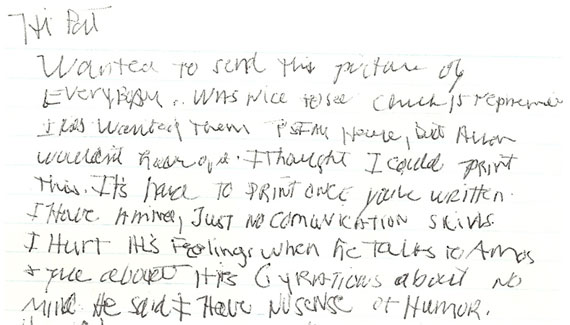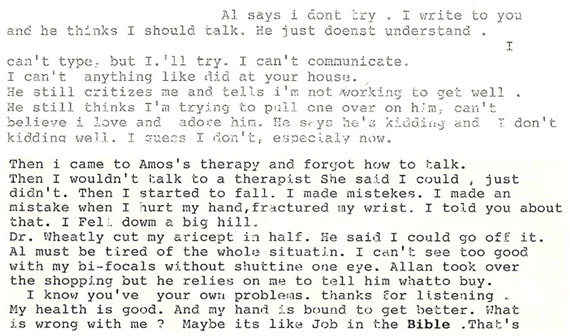Pat Adams’s Story
My Sister’s Letters
My sister Nancy’s identifiable symptoms began in 2006. She passed away on October 25, 2012. She was in Tennessee and I was in Virginia so our communication was increasingly done via mail, as it became difficult for her to talk. She was diagnosed at first with a stroke, then with Alzheimer’s/dementia. She went through all the classic symptoms and was finally diagnosed quite a few years later at the University of Tennessee with PSP. Her family told me she was falling a lot and sent pictures of her bruised face. My first indication that something was drastically wrong was her handwriting. She had beautiful handwriting and it became less and less readable, to the point that I would send her address labels to put on the envelope. She began typing on the word processor and gradually it became almost unreadable and finally the letters stopped.
These are excerpts from her letters.
March 2006:

It’s interesting that even this early she seemed to know something wasn’t right with her brain and secondly, her eyesight. She may have been using the prisms here.
This was sent sometime around 2008 after the disease had progressed. I had been encouraging her to print rather than write, hoping that she would have better control of her hand.

As time went on, she gave up trying to print and went to the word processor. She did really well with that for a while. It became clear to me through her letters that she was not suffering from Alzheimer’s. I was stumped. She came and stayed with me for a few days and we played scrabble, we talked, I asked her questions about our childhood – her memory was clearer than mine. She was having trouble with balance and talking at that point. We practiced her printing but it just didn’t seem to work so I encouraged her at that time to use the word processor as she wasn’t comfortable with the computer. I ended up writing her doctor a letter and explained my concerns and doubts about her diagnosis. I have no idea if that influenced him or not, but she was eventually referred to U.T. Research on brain diseases.
My reason for writing this is to help people understand the symptoms of the disease and how their reactions can affect the person with the disease. It is so harmful to them because the loved ones just don’t understand.
December 2008:

This illustrates the frustration of dealing with health care providers who are totally unfamiliar with PSP. For a period of time, the medications she was on made her condition worse. Along with the Aricept, she was taking an anti-depressant – both seemed to make her drowsy and also make her balance even worse than it would have been without the drugs. This last note was one I received shortly before she stopped writing me.

There is a danger in sharing these letters because I never want my brother-in-law to think that I judge him. He did a wonderful thing taking care of her for all those years, and especially as she got worse, and he eventually understood that she could not and would not get better.
The big issue with this disease is that the person fully understands what’s going on around them, but cannot express their feelings. Of course, life goes on around the person with the illness and it sometimes makes things even more difficult. During the early stages, their son-in-law had a brain aneurism and had very severe surgery which left him disabled. My sister fell and messed up her shoulder and had to have surgery and eventually the arm became frozen and unusable. Her many falls may have made things worse. There was a wedding, babies were born. Nancy was always there in the middle of the family activities up until the day she died. Near the end, she could still muster a giggle and definitely could recognize people. She received love and affection and was under Hospice care when she passed. The family was very blessed to have good in-home help and lots of relatives and friends to give them support.
I could go on with the notes and letters – some would tear your heart out. The important thing to take from this is folks need to be made aware. I discovered that a man right here in my neighborhood had PSP. My sister-in-law works in the local nursing home, and I’m convinced there are people there with PSP and are aware of what goes on around them even though the employees don’t have a clue. The first line of defense should be with the family doctor, the nurses in the hospitals and the people who observe the symptoms but have never heard of the disease.